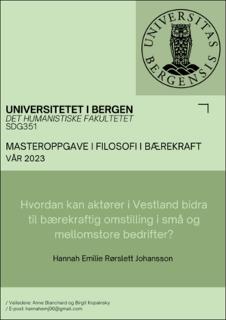| dc.contributor.author | Johansson, Hannah Emilie Rørslett | |
| dc.date.accessioned | 2023-06-09T07:59:35Z | |
| dc.date.available | 2023-06-09T07:59:35Z | |
| dc.date.issued | 2023-04-20 | |
| dc.date.submitted | 2023-06-07T22:00:01Z | |
| dc.identifier.uri | https://hdl.handle.net/11250/3070654 | |
| dc.description.abstract | Denne masteroppgaven undersøker problemstillingen: Hvordan kan aktører i Vestland bidra til bærekraftig omstilling i små og mellomstore bedrifter (heretter SMB-er). Oppgaven reflekterer erfaringer og observasjoner fra et praksisopphold hos UN Global Compact Norge, der oppgaven ble utformet. Formålet med oppgaven har vært å danne et nyttig faggrunnlag for aktører i Vestland som arbeider med bærekraftig omstilling i SMB-er. Et tilbakekoblingssløyfe-diagram basert på systemdynamisk metode ble utviklet for å forstå hvilken rolle de ulike aktørene spiller, og kan spille, i omstillingsprosesser i SMB-er. Diagrammet er utviklet basert på litteratur om bærekraftig omstilling i SMB-er, og data samlet inn gjennom observasjoner og intervjuer fra åtte ulike aktører i regionen som jobber med SMB-er. Fra diagrammet diskuteres to barrierer for bærekraftig omstilling i SMB-er: kostnaden for å investere i bærekraftig omstilling og kunnskap om bærekraft og påvirkning. Videre ble et uoversiktlig tilbud, barrierer for samarbeid mellom aktører og utvikling av tilbud, og miljøkrav som pådriver for bærekraftig omstilling i SMB-er diskutert som utfordringer og muligheter aktørene møter i sitt arbeid med SMB-er. Basert på funn fra diagrammet defineres ulike roller aktører i regionen kan ta for å bidra til bærekraftig omstilling i SMB-er basert på Journeault et al. (2021) sitt rammeverk. Rammeverket definerer fem roller aktører kan ta: utdanner, analytiker, spesialist, koordinator og finansiell bidragsyter. I tillegg ble rollen som politisk påvirker identifisert som viktig for å arbeide med påvirkningsarbeid knyttet til miljøkrav rettet mot SMB-er. | |
| dc.description.abstract | This master thesis explores ‘How can actors in Vestland encourage sustainable transitions in small and medium enterprises?’ (from this point SMEs). SMEs are currently lagging behind in sustainable transitions compared to larger enterprises. Several studies have pointed to resources, attitudes, and company culture, as well as a lack of awareness as barriers in the transition processes. Due to this, the aim of the thesis was to understand how actors might lower the thresholds SMEs face to start transition processes. The thesis was developed through an internship at UN Global Compact Norway, with an aim to provide useful information for actors in the region that want to develop new activities or improve their existing activities for SMEs. This is important from a sustainable development perspective because 98 percent of businesses in Vestland are SMEs. Due to this, SMEs will have an essential role in transitioning the region to become more sustainable, stated in Vestlandsporteføljen (2021). A causal loop diagram based on system dynamics methods was developed to understand how the different actors play, and can play, different roles in transition processes in SMEs. The diagram was developed based on literature on sustainable transitions in SMEs, and data collected through observations and interviews from eight different actors in the region that work with SMEs. From the diagram, two barriers for sustainable transitions in SMEs are discussed: the cost for investing in sustainable transitions and knowledge about sustainability and impact. Furthermore, the accessibility to activities, barriers for cooperation among actors and development of activities towards SMEs, and environmental regulations as a driver for sustainable transitions in SMEs was discussed as challenges and opportunities that the actors face in their work with SMEs. Journeault et al. (2021)’s framework, which identifies five roles stakeholders might take, trainer, analyst, specialist, coordinator and financial provider, was used to identify potential roles the different actors in the region can take to encourage sustainable transitions in small and medium enterprises. | |
| dc.language.iso | nob | |
| dc.publisher | The University of Bergen | |
| dc.rights | Copyright the Author. All rights reserved | |
| dc.subject | sustainable transitions | |
| dc.subject | actors | |
| dc.subject | SMEs | |
| dc.subject | stakeholders | |
| dc.subject | bærekraftig omstilling | |
| dc.subject | aktører | |
| dc.subject | SMB-er | |
| dc.subject | interessenter | |
| dc.title | Hvordan kan aktører i Vestland bidra til bærekraftig omstilling i små og mellomstore bedrifter? | |
| dc.title.alternative | How can actors in Vestland encourage sustainable transitions in small and medium enterprises? | |
| dc.type | Master thesis | |
| dc.date.updated | 2023-06-07T22:00:01Z | |
| dc.rights.holder | Copyright the Author. All rights reserved | |
| dc.description.degree | Praksisbasert masteroppgave | |
| dc.description.localcode | SDG351 | |
| dc.description.localcode | MAHF-SDG | |
| dc.subject.nus | 719999 | |
| fs.subjectcode | SDG351 | |
| fs.unitcode | 11-75-0 | |
